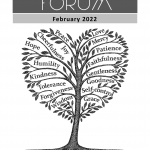webdev
Thought for the Week – 27th February 2022
Ukraine
“The world is dismayed, though perhaps not surprised, to find that Russia has illegally invaded Ukraine in an act of unprovoked and unjustified aggression. We fear that the toll on the brave people of Ukraine will be heartrending and dreadful. The world has had to engage in defensive action to protect the innocent and to contain aggressors in the past.
We must pray for the government and people of Ukraine, the people of Russia who live under an authoritarian regime, for the leaders of the world that they will respond with wisdom and courage and for the restraint of evil and the restoration of peace, with justice.
Psalm 10 says “Arise, LORD! Lift up your hand, O God. Do not forget the helpless.”
And so we ask –
Sovereign Lord, you observe all those who dwell on earth. Have mercy we pray on those who now suffer the miseries of a war not of their own making. Have compassion on the wounded and dying; comfort the broken-hearted; confound the hatred and madness of those who make war; guide our rulers, bring war to an end, bring peace across the world. Unite us all under the reign of your Son, the Prince of Peace, before whose judgement seat the rulers of the world will give account, and in whose name we pray. Amen.”
Rev David Poyner
Thought for the Week – 20th February 2022
Jubilee
We will be hearing a lot about jubilees in the coming months, as we mark the Platinum Jubilee of the Queen, after 70 years on the throne. I have always associated jubilees with royal events and wedding anniversaries; silver, golden and diamond. However, the word jubilee itself is from the Bible and takes us back to world 3000 years ago.
In the Book of Leviticus, mixed in with some bizarre (to our eyes) regulations on worship, are instructions on how the people of Israel should order their society so that it was just and fair. There are constant reminders to look after the widow, the orphan and the alien (immigrants who were not Jews). There are also instructions for care of the environment; every seventh year no crops were to be grown to restore the fertility of the soil. After the end of seven times seven years (49 years), every 50th year was particularly special. It was to be marked by the blowing of rams’ horns throughout the land; all land was to be restored to its original owners, all slaves were to be freed. It was a resetting of society, to ensure that wealth and privilege did not become ingrained and a time of celebration. The Hebrew word for the rams’ horns is yobel or jobel; Leviticus says that the 50th year was to be the year of the Ram’s Horn, Jobel, which has come to us jubilee.
As we mark the jubilee this year, we would do well to reflect on its original purpose, as described in one the least-fashionable books in the Bible. Our society is not that of 3000 years ago, simple solutions applicable then may not work today; but we must surely share the aspirations for fairness and justice.
Rev David Poyner
Highley Forum – February 2022
Thought for the Week – 13th February 2022
Service and Freedom
It was not until last Saturday night that I realised we were about to celebrate the 70th anniversary of the accession of the Queen to the throne. I suspect that whatever anyone thinks about the role of the monarchy as an institution, they would have to respect the Queen for the way she has conducted herself over her reign. At the very beginning, she promised that she would serve us, her subjects. In her most recent message to mark the jubilee, she signed herself “your servant”, in her letter to the nation. Together with her Christian faith, perhaps because of it, service has been central to her life. It was also something that her late husband, Philip understood, as became apparent in the tributes paid to him at his funeral a few months ago.
Ideas of service and duty can be misused; they can be part of a structure to hold individuals down. But Jesus himself took on the role of a servant; indeed, in the account of how he washed his disciples’ feet, he identifies himself not just as a servant but, in the Greek used by the Apostle John to describe the event, as a slave. Perhaps that is a shocking thought, but elsewhere, the service taught by Jesus, that of living in total mutual love, is described as liberation, “perfect freedom” from the self-interest of the world. That I think is a quality the Queen seeks to model in her life; it is also something we can also aspire to. The servant may be the one who is truly free.
Rev David Poyner
Thought for the Week – 6th February 2022
Candlemas
On Wednesday of this past week, the church celebrated Candlemas. This marks the end of the Christmas/Epiphany seasons and starts the countdown to Lent and Easter. In some cultures, this is the day the last of the Christmas decorations are taken down; at a meeting at work this week, a colleague complained how the wind was blowing her Christmas tree that she had left outside; however I suspect this was not because she intended to mark Candlemass… The name comes from the custom of blessing the candles that were going to be used in church throughout the coming year. However, at the heart of the festival is the commemoration of the presentation of the infant Jesus in the temple at Jerusalem, where he was to be admitted into the Jewish faith by circumcision. Behind this, is a command from the Old Testament, of how every first-born male was to be consecrated to God, to mark the liberation of the Israelites from Egypt, where they were kept as slaves.
This link between freedom from oppression and Candlemas is perhaps not one that gets much attention. But it provides a reminder that we worship a God who cares about justice, a God who brings freedom for those in captivity or oppression. Jesus himself, at the very start of his ministry, in his home village of Nazareth, declared that he had come to bring freedom. This includes political and economic freedom, but perhaps in our world we can also think of the social and mental pressures that we feel and which seek to enslave us. I am very aware of the effect of these in the workplace and in education, the way many young people in particular struggle. At Candlemas we are reminded of the God who liberates us from the pressures of an unbalanced world.
Rev David Poyner

